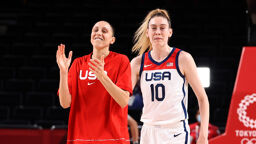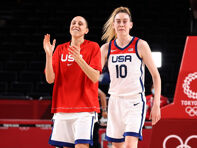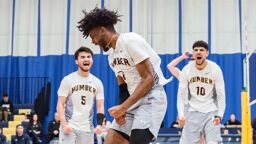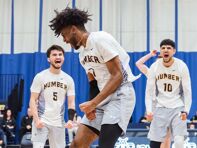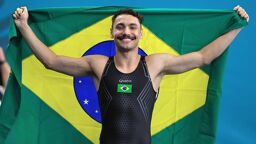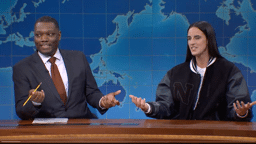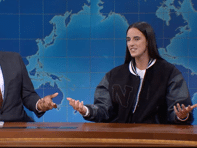It’s been almost a month since the Los Angeles Galaxy traded for Robbie Rogers, sending their leading scorer, Mike Magee, to the Chicago Fire. That Memorial Day weekend was an historic moment as Rogers became the first openly gay athlete to play in one of the “Big Five” (or “Big Four Plus One”) men’s pro sports leagues.
Yet lost in the historic hoopla was the reality of the trade that brought Rogers into the history books. There was a calculated gamble and a measured risk by Major League Soccer, the front office of the Galaxy and Rogers himself. While Rogers will forever be a "first," his sports legacy will be tied to what unfolds on the field in the months and years ahead.
The story of the trade is just ending its first chapter. While the book may end in a third and fourth consecutive MLS Cup trophy for the Galaxy, and game-winning goals by Rogers himself, chapter one didn't go as planned. As results from the Fire and Galaxy creep in, the risk of rushing Rogers back into Major League Soccer is becoming evident.
Since the trade, the Fire have been, well, on fire. They've mounted an impressive 4-0-1 record over that span, going without a loss for five games for the first time since last September. Magee, sent to Chicago in exchange for Rogers, has also been playing out of his head, scoring five goals in those five games. He's only one point behind the league leader in goals scored.
The Galaxy have headed in the other direction. Since their win against the Sounders the day after acquiring Rogers, the team has gone 0-3-1, scoring a total of one goal in those four games. They’ve slipped from fourth to a tie for fifth in the Western Conference standings. Rogers has not yet been able to play a full game. While they suffered a 5-0 drubbing by the New England Revolution, the Galaxy’s worst loss in 11 seasons, the low point may have been a loss to the Carolina Railhawks in the U.S. Open Cup.
"That was embarrassing," said Los Angeles Times columnist Kevin Baxter, who covers soccer. "It was like a big league team losing to a minor league team."
The Galaxy’s slump and the Fire’s ascent aren’t really Rogers’ fault. While he’s been unable to play a full game, the Galaxy lost leader Robbie Keane and defender Omar Gonzalez for much of that stretch. Nothing Rogers could possibly do would have stopped the Revolution’s five-goal barrage in Foxboro. If pointing fingers, the blame could rest on the shoulders of the Galaxy front office, who sent away their leading scorer at a time when they knew Keane was taking a break from MLS.
Yet in a certain way, Rogers has played a role in this. I'm a big fan of athletes playing where they want to play. Too often, they're traded like cattle to parts unknown cast in with teammates they've never met. But making demands has its consequences. The day Rogers said he would only play in Los Angeles he forced the hand of Major League Soccer. He met with the Fire front office; He was part of this deal. Like LeBron James taking his talents to South Beach, when the decision is yours, you own it.
"If a baseball team traded Barry Bonds and suddenly didn't hit any home runs, the correlation would be obvious," Baxter said. "It's not irrelevant that they haven't scored any goals since Magee left."
Yet the legacy of the trade, and of Rogers, aren't made in one day, one month or even one season. His historic moment past, he has plenty of time to leave his mark on the game. The Galaxy said they were making the trade for the future. While that future may have jeopardized this month of play, LAGConfidential's Josie Becker is optimistic. She said the team is a work in progress, with players coming and going and Rogers not yet up to full speed.
"Going forward I expect there to be many, many goals in the Galaxy's future," Becker said.
Those goals may come soon. The Galaxy’s next two games are just what the doctor ordered, with match-ups against the Western Conference’s two worst teams featuring two of the three worst scoring defenses in the league: Chivas USA and the San Jose Earthquakes. It’s a great opportunity for Rogers and the Galaxy to score some goals, gain some confidence and turn the season around. They’ll need it, as the month of July features five challenging match-ups.
Galaxy fans seem mixed on the trade. While some rue the day their team sent away their most popular player, many others are willing to wait and see. They like the slightly younger Rogers and the speed he brings to the outside. They recognize the Galaxy entered last year's playoffs as the 4-seed in the West and took home the MLS Cup. No one is panicking yet.
But the Galaxy are the two-time defending MLS Cup champions. Expectations are high. And the man they traded to Chicago was at his best in the playoffs.
"I'm not concerned with whether the trade pays off right now," said Becker. "It's about how it turns out in August and September and the playoffs. That was Magees's bread and butter, those playoff goals. He's like the Robert Horry of soccer."
The reality of the business is that some trades pay off and some don't. In 2007, the NFL's New England Patriots send a fourth-round draft pick to the Oakland Raiders for Randy Moss; That year Moss set the NFL's single-season record for touchdown receptions. In 2011, the Oakland Raiders traded two top picks to the Cincinnati Bengals for quarterback Carson Palmer; He lasted only two seasons with the team.
The difference here is that Rogers' legacy is a historically significant one. He will always be a special player for breaking the "gay" barrier in Major League Soccer; No one can take that away from him. But if two seasons from now he were to possibly flame out with the Galaxy, it wouldn't help anybody. A couple sub-par seasons for a team used to contending for league titles would leave the fan base wondering if the front office went too far in trading away one of their best players for the chance to make history. Rogers' legacy, from a sports perspective, will forever be tied to that trade and Magee.
"It may be that the Fire gain more than the Galaxy lose in this trade," Becker said.
God help us if the Fire win the MLS Cup this season.
Baxter agreed that the high profile of Rogers' historic moment, and the media attention he garnered, brought the attention in this trade squarely on him and the Galaxy, and less so on Magee and the Fire.
"If Robbie were another player, we wouldn't be paying much attention to him," said Baxter. "There would be some calls as to why the Galaxy are even playing this guy. It seems as if Robbie is getting some attention that he might not normally get because of who he is."
That's the point. People do care. It is significant. There's a weight on Rogers' shoulders that others simply don't carry. Jackie Robinson didn't become a legend because he was the first, he became a legend because he was great. Without some individual and team success, Rogers goes from legend to asterisk.
It will be beyond this season when we can accurately and fairly assess the full impact of the Rogers-Magee trade. The final chapter of Rogers' legacy will be written years from now when he leaves the Galaxy. But if you were to write a book about the deal that brought Rogers back onto the MLS pitch, chapter one would feature the Fire punching the Galaxy in the gut.
I pray chapter two gets better.
You can follow the LA Galaxy at LAGConfidential. You can follow Chicago Fire news at Hot Time In Old Town.











